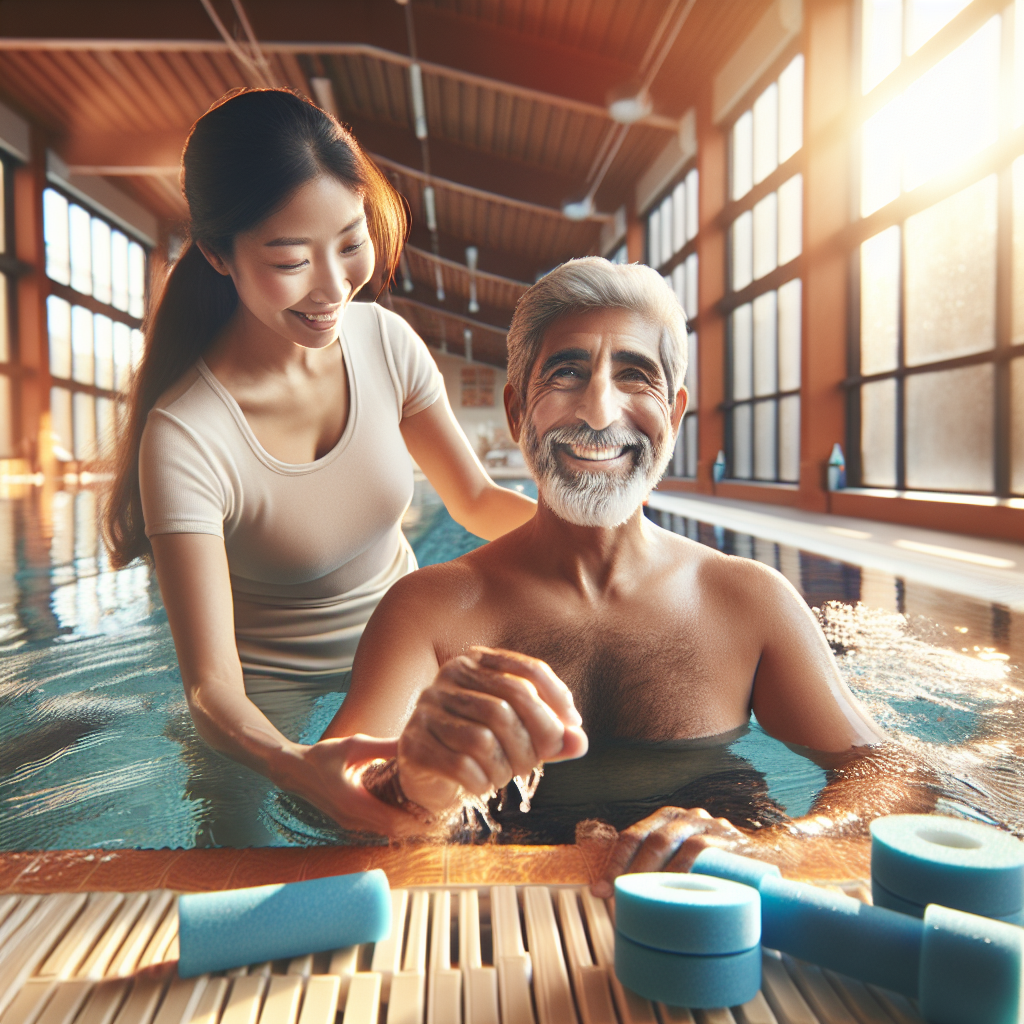Aquatic therapy, also known as water therapy, holds a multitude of benefits for seniors that can enhance their overall wellbeing and quality of life. Through gentle exercises and movements in a warm water pool, seniors can experience increased flexibility, improved muscle strength, and joint mobility without putting excessive strain on their bodies. The buoyancy of the water helps to support and relieve pressure on their joints, while the resistance of the water enables a low-impact workout that can aid in reducing pain and inflammation. Additionally, the soothing nature of water can promote relaxation and mental wellness, making aquatic therapy a holistic approach to senior health and vitality. To learn more click here!
Understanding Aquatic Therapy for Seniors

Aquatic therapy, also known as water therapy or hydrotherapy, is a specialized form of physical therapy that takes place in a pool or other aquatic environment. It involves a range of exercises and movements that are specifically designed to improve physical function, mobility, and overall well-being for seniors.
- Definition of Aquatic Therapy:
Aquatic therapy utilizes the unique properties of water, such as buoyancy, resistance, and hydrostatic pressure, to create a safe and effective environment for rehabilitation and exercise. The warmth and support of the water can help seniors perform movements they may struggle with on land due to pain or limited mobility. - Tailoring Aquatic Therapy for Seniors’ Needs:
Aquatic therapy programs for seniors are carefully tailored to address their specific needs and goals. Trained therapists design exercises that focus on improving strength, flexibility, balance, and endurance, taking into account any existing health conditions or physical limitations. The low-impact nature of water-based exercises reduces stress on joints and muscles, making it an ideal option for older adults with arthritis or other mobility issues.
The Unique Environment of Aquatic Therapy
Aquatic therapy provides a unique environment for seniors to engage in rehabilitation and exercise activities. The properties of water offer distinct advantages that can significantly benefit senior patients:
- Benefits of Water Resistance: Water provides a natural resistance that helps seniors strengthen their muscles without the risk of injury. The resistance of water allows for gentle yet effective workouts, promoting muscle tone and overall physical health in a safe manner.
- Impact of Buoyancy on Senior Patients: Buoyancy in water reduces the effects of gravity on the body, making movements easier for seniors with joint pain or mobility issues. This buoyant force supports the body, decreasing the stress on joints and allowing seniors to move with greater freedom and reduced discomfort during therapy sessions.

Physical Benefits of Aquatic Therapy for Seniors
Aquatic therapy offers a variety of physical benefits for seniors, making it a valuable form of exercise and rehabilitation. The unique properties of water create an ideal environment for seniors to engage in therapeutic activities that can improve their overall physical well-being.
- Improved Joint Flexibility and Range of Motion
The buoyancy of water supports the body, reducing the impact on joints and allowing for a wider range of motion during exercises. Seniors with arthritis or joint pain can benefit from the gentle resistance of water, which helps to increase flexibility and reduce stiffness.
- Strengthening of Muscles Without Added Pressure on Joints
Water provides natural resistance in all directions, making it an effective medium for strengthening muscles without causing strain on the joints. Seniors can perform exercises that target specific muscle groups while enjoying the support and stability that water offers.
- Enhancement of Cardiovascular Fitness
Aquatic therapy can also improve cardiovascular fitness in seniors. Water-based exercises elevate the heart rate and increase circulation, promoting better cardiovascular health. Seniors can engage in aquatic activities that elevate their heart rate without the risk of overexertion or injury.
Targeted Exercises in Aquatic Therapy
Aquatic therapy offers a wide range of targeted exercises specifically designed to address the unique needs of seniors. These exercises aim to improve mobility, strength, and overall well-being through the resistance and buoyancy provided by water. Here are some key targeted exercises commonly utilized in aquatic therapy for seniors:
- Specific exercises for arthritis relief: Water’s buoyancy reduces stress on joints, making it an ideal environment for seniors with arthritis to perform gentle exercises. Range-of-motion exercises, gentle stretches, and low-impact movements can help reduce pain and stiffness associated with arthritis.
- Exercises for improving balance and coordination: Seniors often experience a decline in balance and coordination, increasing their risk of falls. Aquatic therapy offers a safe and supportive setting for practicing balance exercises, such as standing on one leg or walking heel-to-toe. The resistance of water challenges stability while providing a cushioning effect.

– Aerobic exercises for overall health: Aquatic therapy allows seniors to engage in aerobic exercises that are gentle on the joints. Activities like water walking, water jogging, or cycling in the water can elevate the heart rate, improve cardiovascular health, and enhance endurance without causing excessive strain on the body. These aerobic exercises can boost circulation, strengthen the heart, and improve overall fitness levels in seniors.
Psychological Benefits of Aquatic Therapy for Seniors
Aquatic therapy offers a wide range of psychological benefits for seniors, contributing to their overall well-being and quality of life.
- Reduction of stress and anxiety: Immersion in water can have a calming effect on seniors, reducing levels of stress and anxiety. The buoyancy of water supports the body, relieving pressure on joints and muscles, promoting relaxation and reducing tension.
- Improvement in mood and mental well-being: Engaging in aquatic therapy activities can lead to an improvement in mood and mental well-being for seniors. The combination of physical exercise, water resistance, and the soothing properties of water can enhance feelings of happiness, positivity, and overall mental health.
- Social interaction and sense of community in aquatic settings: Participating in aquatic therapy sessions provides seniors with opportunities for social interaction and a sense of community. Group exercises in the water foster connections with others, reducing feelings of isolation and loneliness commonly experienced in older age. Sharing experiences and goals with fellow participants can boost self-esteem and create a supportive environment for seniors undergoing therapy.
Mind-Body Connection in Aquatic Therapy
Aquatic therapy for seniors can significantly enhance the mind-body connection due to the unique properties of water and the specific exercises involved. Here are some key points to consider:
- The calming effect of water on seniors: Water has a soothing quality that can help seniors relax both mentally and physically. The buoyancy of water reduces the impact on joints, allowing seniors to move more freely and with less pain. This reduction in physical discomfort can lead to a sense of calmness and well-being.
- How aquatic therapy promotes mindfulness and relaxation: Engaging in aquatic therapy encourages seniors to focus on the present moment, promoting mindfulness. The rhythmic movements in water, coupled with the sensation of weightlessness, can help seniors let go of stress and tension. This heightened state of relaxation can improve mood, reduce anxiety, and enhance overall mental well-being.
Safety Measures and Considerations for Seniors in Aquatic Therapy
When it comes to aquatic therapy for seniors, ensuring their safety is paramount. Here are some key safety measures and considerations to keep in mind:
- Importance of supervision by trained professionals: Seniors engaging in aquatic therapy should always be supervised by trained professionals, such as physical therapists or aquatic instructors. These experts can provide guidance, support, and intervention if needed during the therapy sessions.
- Recommendations for seniors with specific health conditions: Seniors with specific health conditions should consult with their healthcare providers before starting aquatic therapy. Individuals with conditions such as arthritis, osteoporosis, or cardiovascular issues may require modifications to their aquatic exercises to ensure safety and effectiveness.
- Tips for preventing accidents and injuries in the water: Seniors should always follow safety guidelines when participating in aquatic therapy. Some tips to prevent accidents and injuries include wearing appropriate footwear to prevent slipping, using handrails for support when entering or exiting the pool, and avoiding sudden movements that could strain muscles or joints. Additionally, seniors should stay hydrated and be mindful of their limitations during aquatic therapy sessions to prevent overexertion.
Precautions for Seniors Engaging in Aquatic Therapy
When engaging in aquatic therapy, seniors must adhere to specific precautions to ensure their safety and maximize the benefits of the treatment. Here are some key considerations to keep in mind:
- Proper warm-up and cool-down routines: Seniors should perform gentle warm-up exercises before starting aquatic therapy to prepare their muscles and joints for the session. Similarly, incorporating a cool-down routine at the end of the session can help prevent muscle stiffness and reduce the risk of injury.
- Hydration guidelines for seniors in aquatic environments: Dehydration can be a concern for seniors participating in aquatic therapy, as the water’s buoyancy may reduce the sensation of thirst. It is essential for seniors to stay hydrated before, during, and after their therapy session to maintain optimal performance and prevent any adverse effects of dehydration.
- Equipment and aids to enhance safety during therapy sessions: Seniors should make use of appropriate equipment and aids to enhance their safety during aquatic therapy. This may include non-slip footwear to prevent falls on wet surfaces, flotation devices for individuals with limited swimming abilities, and handrails or grab bars for added stability when moving in and out of the pool.
FAQs: Benefits of Aquatic Therapy for Seniors
What are the benefits of aquatic therapy for seniors?
Aquatic therapy offers numerous benefits for seniors, including reduced pain and inflammation, improved range of motion and flexibility, increased muscle strength and endurance, and enhanced balance and coordination. The water’s buoyancy and resistance provide a safe and effective environment for seniors to exercise without putting strain on their joints.
Is aquatic therapy suitable for all seniors?
Aquatic therapy can be beneficial for most seniors, but it is important to consult with a healthcare professional to determine if it is the right fit for individual needs and conditions. Seniors with certain medical conditions, such as open wounds, uncontrolled diabetes, or contagious skin infections, may not be suitable candidates for aquatic therapy.
How often should seniors participate in aquatic therapy sessions?
The frequency of aquatic therapy sessions for seniors can vary depending on individual needs and goals. Generally, participating in aquatic therapy sessions 2-3 times per week can help seniors experience the full benefits of the therapy. It is important to work with a qualified therapist to create a personalized treatment plan that suits the specific needs of each senior.
Can aquatic therapy help with conditions such as arthritis and osteoporosis in seniors?
Yes, aquatic therapy can be particularly beneficial for seniors with conditions such as arthritis and osteoporosis. The buoyancy of the water reduces the impact on joints, making it easier and less painful for seniors to exercise. The resistance of the water also helps improve muscle strength, which can help alleviate symptoms and improve overall quality of life for seniors with these conditions.